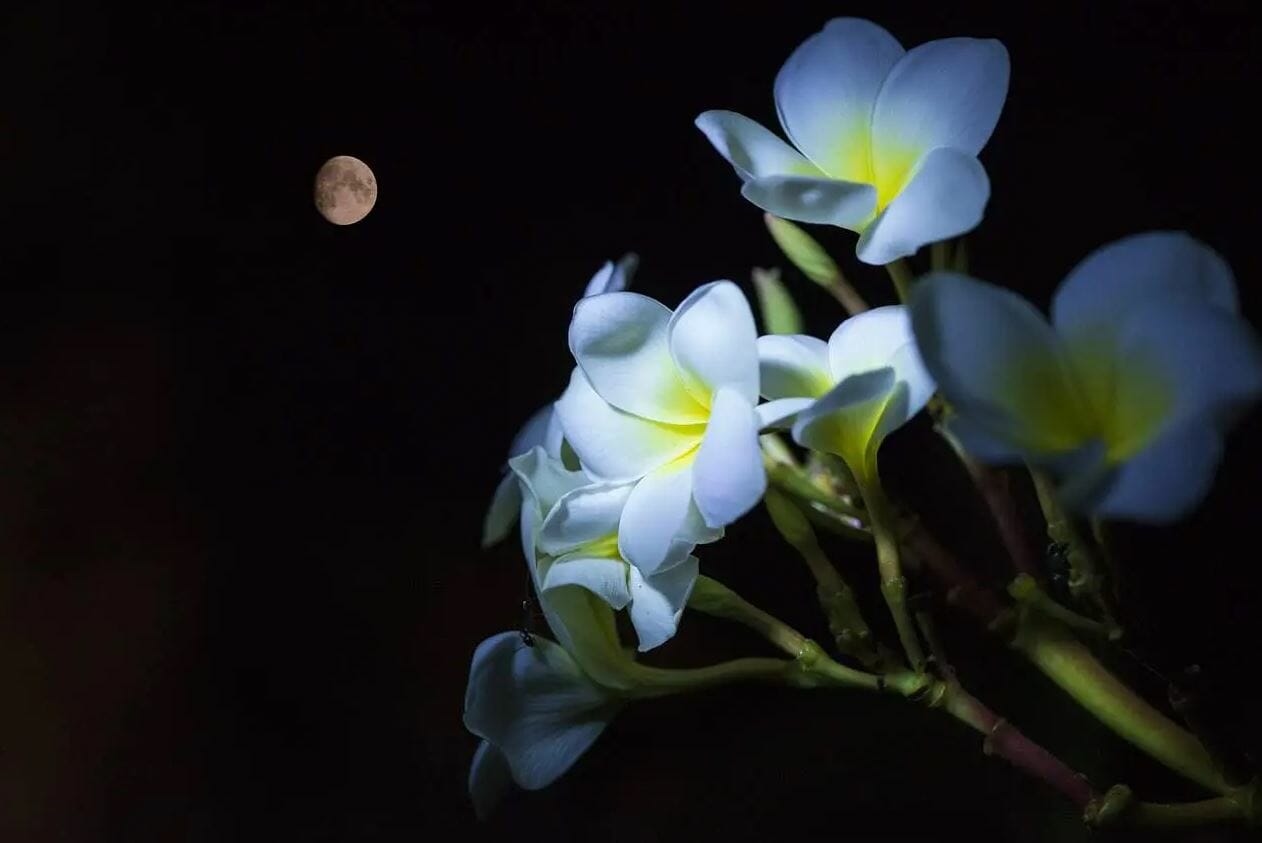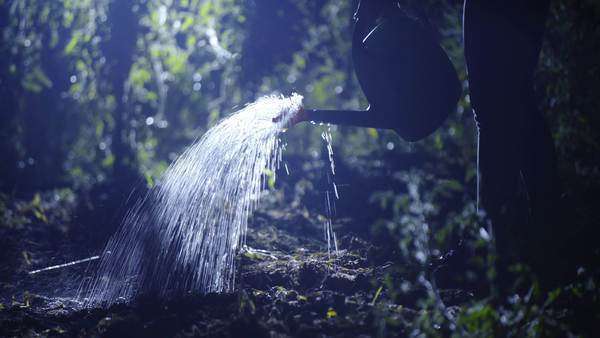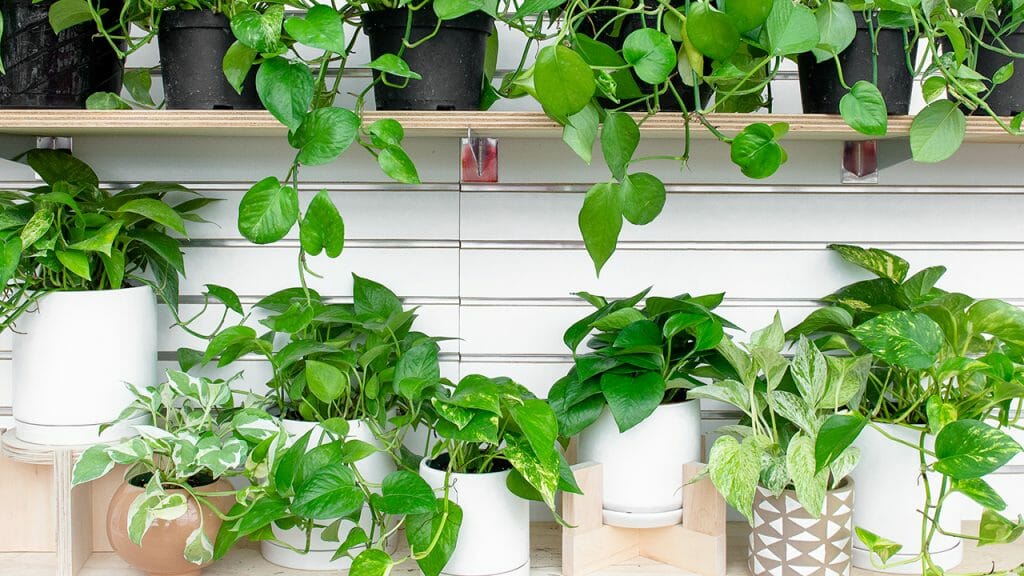
So, do plants grow at night? Plants do grow at night which contradicts the common myth that plants only grow in sunlight. In fact, some plants even grow faster at night than during the day.
To understand how a plant grows, you need to understand the processes of photosynthesis and respiration. These are two separate processes but both are necessary for plant growth.
Read on to learn more about photosynthesis, respiration and how a plant grows at night or during the day.
Photosynthesis vs Respiration
Most people have learned in biology class that plants use photosynthesis to produce their own food. However, consuming the energy of this food is done through respiration.
Photosynthesis is a process whereby plants absorb sunlight to convert water and carbon dioxide into glucose. This glucose is the source of energy for plants, just like with humans.
Since photosynthesis cannot occur without sunlight, plants only use this process during the daytime when there is light. That means there is no photosynthesis at night.
Respiration is a process whereby plants consume their self-made glucose for energy. This energy is what the plant uses to grow.
Plants have circadian rhythms so they can distinguish between daytime and nighttime. During the day, the plant both photosynthesizes and respires but at night photosynthesis stops and the plant only respires.
| Process | Photosynthesis | Respiration |
| Gas In | Carbon Dioxide | Oxygen |
| Gas Out | Oxygen | Carbon Dioxide & Water Vapour |
| Time | Daytime Only (Sunlight) | Both Day & Night |
Plant Growth During the Day and at Night
Plants grow both at both daytime and nighttime. However, they grow differently.
If you have looked up plant care, you will have come across the advice to place plants near windows for more sunlight. If you follow this advice, you might notice that plants tend to grow towards the sun.
During the day, when plants are absorbing sunlight their growth is more horizontal, in the direction of the sunlight. Plants that enjoy sunlight also tend to grow larger leaves – larger leaves means more chloroplasts which means more sunlight absorption.
However, this does not mean that photosynthesis is a growing process. Plants only grow during respiration but sunlight can affect in which direction plants grow.
At night, plants tend to grow more vertically because there is no sun to direct them. Depending on the type of plant, the growth in height may be more noticeable.
Some plants grow faster at night than during the day.
Some plants grow faster at night because the photosynthesis process has stopped, allowing the plant to focus on respiration. However, the difference in rate of growth depends on the type of plant and in many plants there is no significant difference.
Watering Plants at Night
As gardeners and plant enthusiasts seek to optimize their plant care routines, the timing of watering has become a subject of much debate.
Watering plants at night is surrounded by misconceptions and varied opinions.
Plants engage in a delicate balance of photosynthesis and respiration, processes that are influenced by the time of day. During the night, the absence of sunlight halts photosynthesis, and plants focus on respiration and repair. This period of slowed growth and activity raises questions about the appropriateness of nighttime watering.
The Risks:
- Fungal Growth and Disease: The cooler, more humid conditions at night create an ideal environment for fungal spores to thrive. Water remaining on leaves and in the surrounding soil can facilitate the spread of diseases, potentially harming the plant.
- Reduced Absorption Efficiency: Without the sun’s warmth, water evaporates more slowly, and plants absorb nutrients less efficiently. Excess moisture can lead to root rot and other complications.
The Benefits:
- Reduced Evaporation: Watering at night can be more water-efficient, as the cooler temperatures reduce evaporation rates. This means that more water goes directly to your plants, rather than being lost to the air.
- Stress Relief for Plants: For plants stressed by heat or sun exposure during the day, nighttime watering can provide much-needed relief and help in recovery.
Best Practices:
- If you choose to water at night, aim to do so early in the evening to allow some time for the water to absorb and the foliage to dry before temperatures drop further.
- Use drip irrigation or soaker hoses to deliver water directly to the soil, minimizing moisture on leaves and stems.
- Regularly check your plants for signs of fungal disease and adjust your watering schedule accordingly.
While watering plants at night can offer certain benefits, it’s crucial to weigh these against the potential risks. Understanding your specific plant species, local climate, and soil conditions will guide you in making the best watering decisions for a healthy and thriving garden.

Do Plants Grow Faster in the Dark?
The idea that plants grow faster in the dark is a bit of a misconception. Plants don’t necessarily grow faster in the dark; they grow differently. Here’s what’s really happening:
- Daytime Growth (Photosynthesis): During the day, plants perform photosynthesis, using sunlight to create food (glucose) and oxygen from carbon dioxide and water. This energy fuels growth and other functions.
- Nighttime Growth (Respiration): At night, in the absence of sunlight, photosynthesis stops, but respiration continues. During respiration, plants break down the sugars they produced during the day to fuel their growth and other activities. This is when plants mainly focus on growing in size and repairing any damage.
Some plants exhibit what’s known as “nocturnal growth spurts.” For example, certain types of plants might extend their stems or leaves more rapidly at night. This can be due to various reasons, such as:
- Lower temperatures: Cooler night temperatures can reduce stress on plants, allowing them to focus their energy on growth.
- Hormonal changes: Certain growth hormones in plants might be more active during the night.
- Turgor pressure: Some plants increase in size at night due to changes in water pressure within their cells, not because they are actually growing faster.
While it might seem like plants are growing faster in the dark, they are just continuing the growth process in a different way than they do during the day.
Overall growth rates depend on many factors, including the type of plant, the environmental conditions, and how much energy the plant has stored from photosynthesis during the day.
So, while plants do grow at night, saying they grow faster in the dark isn’t quite accurate.
They’re just continuing their growth in a different mode, using the energy they stored during the day.
Frequently Asked Questions:
What Do Plants Do in the Dark?
When there is no sunlight, plants continue to respire. During respiration, plants consume the stored energy they created during photosynthesis and use that energy to grow.
Can Plants Be Watered at Night?
Whether it is okay to water a plant at night depends on the environment. In many cases, it is not recommended to water plants at night because it could potentially cause root rot.
At night, water evaporates slower because of the cooler temperatures and lack of sunlight. This means that pot soil stays saturated for longer.
At the same time, plants require less water at night because they don’t photosynthesize in the dark. Less water absorption and longer saturated soil are a major cause of root rot which is why most houseplants should not be watered at night.
The exception is for outdoor plants in very hot areas. In tropical weather, it is better to water outdoor plants nearer to dawn and dusk because high temperatures could cause the water to evaporate before the plant is able to absorb it.

What Plant Can Live in the Dark?
Certain plants can survive in dark rooms because they need very little sunlight. Examples of these types of plants include:
- Corn plant
- Spider Plant
- Devil’s Ivy
- Snake Plant
- Moth Orchid
- Peace Lily
- Dracaena
- Pothos
- Philodendron
- Boston Fern
- Zee Zee plant
- Cast iron plant
- Prayer plant
- Peperomia
- Rex Begonia
Summary
Many people wonder if plants grow when it’s dark outside. The answer is yes, they do grow at night, but it’s a bit more complicated than that. Some people think that plants only grow during the day when they can do photosynthesis, which is how they make food using sunlight.
Plants actually grow because of a process called respiration, which happens all the time, day and night. Respiration is when plants use the food they made during the day to grow and stay healthy.
So, even when the sun goes down and plants stop making food, they don’t stop growing because they keep using the food they already have.
While it’s true that some plants seem to grow more at night, this isn’t the same for all plants. Most plants grow about the same amount during the day and night. The idea that plants grow faster at night might come from the fact that it’s cooler and less stressful for them, or because they stretch out more when it’s dark.
Understanding that plants grow all the time, not just when it’s light, is really important if you’re taking care of plants. It helps you realize that plants need attention both during the day and at night, and it can help you take better care of them. By knowing about their night-time growth, you can make sure your plants are healthy and happy all the time.


